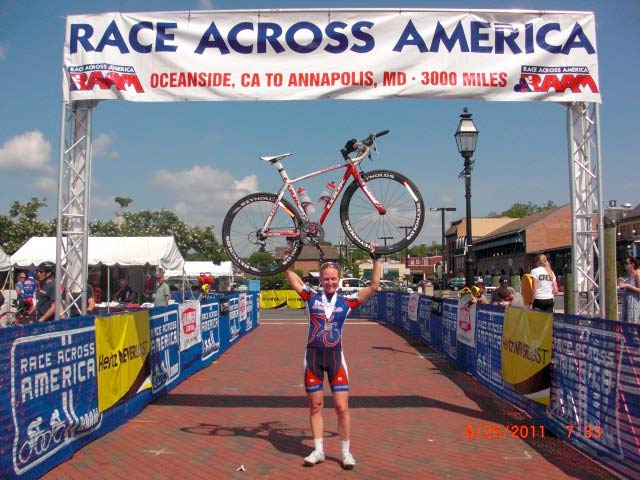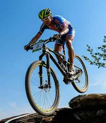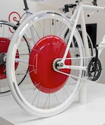By Karen Kefauver
December 2, 2011
Link to Sentinel article
 Jennifer Kalich had plenty of time to battle her demons, celebrate her triumphs and feel her body firing on all cylinders while she was riding her bike across America over the summer.
Jennifer Kalich had plenty of time to battle her demons, celebrate her triumphs and feel her body firing on all cylinders while she was riding her bike across America over the summer.
For almost a week, Kalich pedaled day and night while racing on a relay team in the Race Across America [RAAM], one of the most respected and longest-running endurance sports events in the world. She and her seven teammates on Team Donate Life rode 24 hours a day from Oceanside to Annapolis, Md., and finished the epic race in six days, 16 hours and 17 minutes.
“I wanted to see how much farther I could push myself and see how much I could achieve,” said Kalich, 36, who latched onto the idea of RAAM after her friend completed it in 2010.
But the Watsonville High graduate and Salinas resident had been cycling for only three years and wasn’t ready to tackle the 3,000-plus miles by herself. So, she joined Team Donate Life.
At the race start line, she was still a stranger to the group of five men and two women — and, more or less, to their cause: To help promote awareness for live tissue and organ donation and transplantation. By the end of the race week, however, they, more so even than the ride, had changed her outlook on life.
The two other women on Kalich’s Team Donate Life — one of five squads from the organization participating in RAAM 2011 — had undergone surgery in 2008. One donated a kidney, and the other received it.
“I realized that I was racing for the wrong reason,” Kalich said. “It was mainly a selfish reason: I was racing because I wanted to accomplish it physically. But I realized that there was more to the race. It was about our cause. Even though someone had explained it to me earlier, I didn’t get it till I was in it.”
Kalich describes it as an “epiphany.”
“As I rode with the women who had undertaken surgery and saw how strong they were, I slowly became more and more amazed. I developed a passion for an organization. I had never understood the cause, but finally, I got that opportunity and it was amazing.”
RAAM, which is heading into its 31st year in 2012, is traditionally built on the participation of solo cyclists. Opening it up to teams has had its benefits, said RAAM Executive Director Rick Boethling.
“RAAM has evolved over time to include teams,” Boethling said. “It is really cool that all of the racers get to experience the event on different levels and get to race side-by-side with some of the best endurance athletes in the world.”
That Kalich was racing in RAAM so soon after she took up the sport is amazing in itself.
Kalich started cycling for the first time only three years ago after running led to knee problems. She bought a bike, jumped on and soon joined a group bike ride with skilled cyclists.
After one rider criticized her lack of riding skills, [“Don’t call me, you don’t know how to ride!”] she grew more determined to improve.
“I practiced every day,” recalled Kalich. “Every day was longer and harder. I was extremely diligent. It was a solitary effort while I tried to learn how to ride a bike. I consulted as many people as I could. I learned about nutrition, recovery and I got to feel stronger. I was constantly reaching for info and support.”
A year after she started riding, Kalich entered her first bike race, a circuit race at Fort Ord, part of the CCCX series.
“I was totally sucked in, completely lured by the adrenaline rush of racing,” she said. “I looked at racing as an excuse to stay fit.”
Currently a member of the California Giant Cycling Team and coached by pro cyclist Ben Jacques-Maynes of Watsonville, Kalich started seriously contemplating RAAM in early 2010. A year ago, she started working with trainer Chris Burnham to develop workouts to prepare for the massive ride.
“When I go, I go big,” she said with a laugh.
The mother of three with a job in sales admitted it was hard to ramp up training for RAAM and took a chunk out of family time.
“I was very frustrated in the beginning because endurance riding is counter-productive to racing. I watched my racing go downhill. I didn’t realize the extent it would impact my results and I began to question my training,” Kalich said. ” It was an emotional challenge and disheartening to work so hard to get where I was, then turn around and do endurance. Instead of 12-hour weeks I was on the bike training 25 hours a week. I had to ride longer and at a higher wattage for a longer period of time.”
Despite challenges of training, she was determined to follow through with her plan to race RAAM. She had the opportunity to see the RAAM movie “Bicycle Dreams” and rather than being deterred, she said the film “made me want to do it that much more.”
Fortunately, her enthusiasm and demanding preparation paid off at RAAM in June.
“I knew how to sustain my energy level from start to finish,” she said proudly. “I worked really hard at mentally preparing myself.”
What she couldn’t fully prepare for was the emotional roller coaster and the sleep deprivation she would endure.
“People hide things they don’t want to deal with. On a daily basis, we find things to distract ourselves,” she said. “RAAM gives you ample time to think about everything. You are alone. While you are cranking from the waist down, your mind just explores.”
One low point stands out.
“As we were climbing the Colorado Rockies, I remember already experiencing a level of defeat. I was concerned that if the entire route was going to be this challenging, that we were going to have seven days of hell,” she said. “But once we got over the Rockies, away from the altitude gain, the world opened up and I was on fire.”
The amazing physical endeavor and the mental highs and lows are not what make Kalich proudest. Nor was the highlight seeing the country’s landscapes: She rode mostly during the night.
“RAAM was a breakthrough on my outlook on life,” Kalich said. “It was a breakthrough in a physical sense, but it was so much more emotional. It forced me to deal with uncertainty about aspects of my life. I decided I am content.”
For Kalich, being content now means spending more time with her kids, training for road races and planning a future return to RAAM, first on a smaller relay team, then eventually as a solo competitor.
“Our team experienced some very difficult challenges,” said Kalich, “but with the support of our amazing crew members, we pulled off one of the most challenging races in the world!”
Contact Karen Kefauver via her website, www.karenkefauver.com, which includes links to more bicycling stories, photos and her Sentinel cycling blog at www.santacruzlive.com/blogs
‘Bicycle Dreams’
About the film
The Race Across America is an epic, 3,000-mile bicycle race from the Pacific to the Atlantic. First held in 1982, RAAM is considered among the most challenging sporting events in the world. Top solo riders finish in under 10 days, riding more than 300 miles per day and sleeping only a few hours per night. Amid the sleepless grind, riders must cut through the heat of the Mojave Desert, ride up and down the Rocky Mountains, push past the driving winds of the Great Plains and hang on while twisting through the switchbacks of the Appalachians before the making the final sprint to the finish line in Atlantic City. With little prize money at stake, the fundamental goal of the race is simply to finish, a challenge half of all riders fail to meet.
Filmmaker Stephen Auerbach and his crew worked around the clock to capture the highs and lows of the Race Across America. With 18 cameras in the field, the team found innovative ways to document this massive event. To uncover the inner workings of the race, embedded camera operators traveled inside the riders’ crew vehicles, gaining unprecedented access to the cyclists and their teams. Their footage captured emotional and physical breakdowns, late-night strategy sessions and great moments of personal triumph, all in intimate detail. The award-winning film “is an up-close look at what RAAM riders go through,” said Stephen Auerbach, the director and producer of “Bicycle Dreams.” “They deal with searing desert heat, agonizing mountain climbs, and endless stretches of open road. And they do it all while battling extreme exhaustion and sleep deprivation. It’s a great subject for a film.” – Karen Kefauver
If You Go
‘Bicycle Dreams’
Where: Rio Theatre, Santa Cruz
When: 7 p.m. Thursday, Dec. 8
Cost: $15 at the door and in advance online: www.peoplepowersc.org or www.imathlete.com/events/bicycledreams
Details: Proceeds from the film will benefit People Power


